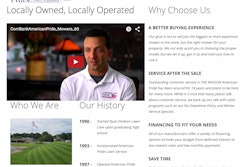
Good systems are essential to a business, particularly as it is growing. Systems (i.e. work processes, procedures and routines) help bring consistency and predictability to your daily operations. Systems help you maintain standards, reduce waste and narrow the margin for error.
As a company grows in both size and complexity, it typically needs more systems in place. The types of systems also start to change and expand. When you're a smaller, one- or two-crew company, you're mainly concerned about estimating/bidding jobs, completing work, getting paid and paying your own bills. As you grow larger, systems pertaining to budgeting, training and personnel management start to become more urgent.
There are a couple of big hurdles many landscape company owners strive to overcome at some point in their careers: jumping from roughly a half million in sales to a million, and later on getting to the $2.5 to $3 million level. This month's Pro Panelists offer insights on how good systems can help you clear each of these common hurdles.
Hands-on owner wants to reach a million
Establish Core Values. When your sales are in that half-million neighborhood, it's important to develop your firm's core values, says Jon Ewing, a business consultant and former contractor. For example, you may subscribe to some of the following values, which your employees should be made aware of:
- Build only on a foundation of quality
- Always come through; promise less and deliver more
- Keep and cultivate loyal clients
- Retain a financial safety net
- Form good relationships with vendors
- Know your market
- Your people are your biggest asset
People Development. When your company is this size, you're likely to still be a hands-on owner wearing many hats. "It's a great time to begin identifying and training well-qualified staff to assist you with various aspects of the business," Ewing says.
Michael Bellantoni, a landscape contractor from New York, couldn't agree more. "You're probably handling all aspects of your business from selling to project and account management to administration," Bellantoni says. "If you don't focus on a couple of good people to help take some of the burden off your shoulders, you are going to struggle; clients are going to complain because they feel like they can't reach you or aren't getting the attention they deserve. Having a good crew leader or office manager who can communicate effectively with clients will help calm the waters when the tide rushes in."
Financial Controls. Company owners should begin to develop a workable financial system with meaningful entries to their income statement. "When harvesting information from your income statement, get in the habit of collecting important data that will assist you with estimating projects and managing your business," Ewing advises.
According to Ewing, you should get to know the following:
- Total labor hours for the period
- Total labor cost for the period
- Sales revenue generated per hour for the period
- Profit generated per hour for the period
Additionally, Ewing says companies of this size must have a useful "chart of accounts" that contains the following:
- Revenue by division (i.e. residential maintenance, commercial maintenance, tree work, residential construction)
- Direct costs (materials, labor, workers' comp, payroll taxes)
- Indirect costs/overhead (vehicles, marketing, insurance, rent, administrative costs, etc.)
"You need to have a good understanding of your cost, overhead and margins," Bellantoni concurs. "You can't wait until the end of the year for your accountant to tell you how you are doing. You need to know your equipment, vehicle and labor cost to make sure you are charging the right prices."
"You also want to start developing a relationship with your banker to establish a line of credit," Ewing adds. "The line may start out small, but will grow along with your business. Never wait until you need the money."
There's one more "relationship" you should start developing at this level, Bellantoni recommends. It's with a business software provider. "You want something that will take you away from handwritten invoices, proposals and estimates. Good software will help with tracking payables, receivables, estimates and contracts. A good software solution will also help with routing and scheduling work."
Mentally prepare to grind it out. The $500k level can be a tough one, reminds California contractor Tom De Lany. "You really want to start doing the things that will help you eventually become a multi-million-dollar company," De Lany relates. "But it's tough because you often don't have the money to do many of those things, like invest in that really good software package or put a good management team in place."
While it's true that you probably can't implement everything in one fell swoop, you can take it one step at a time. "When you start approaching a million, you must start backing away a bit—so you need good systems in place to allow that or you'll just be running around putting out fires all of the time," De Lany says. "You need clear, written job descriptions and documented processes for each job. You also need systems for good pricing to allow for profit so you can make investments going forward. Once you start going down the road of bidding $8,500 for a $10,000 job, you put a lid on your business."
De Lany says he remembers something else about being a contractor in the $500k to $1 million range. "I wasn't really making any more money as I grew, but I realized that if I didn't keep pushing and pass through this gate, my competition would blow right past me."
Eventually, De Lany passed through the million-dollar gate—thanks in large part to the systems he and his team had developed when first embarking on their quest to pass through it. Now onto the next hurdle.
Now I wanna' be a real CEO
De Lany says it's important for the owners of million-dollar companies to recognize that, quite frankly, they just aren't that important. "Your company is going to thrive because of the people you've hired and the culture you have built," De Lany explains.
Delegator in chief. That said, the owner/CEO is obviously still quite important, just in a different way. "Now you have to transition from being a good hands-on manager to a good delegator who can manage other people," Ewing says.
It's essential to have an employee training manual that trains staff to perform various activities your way. "Use this to illustrate a road map for personal growth within your organization," Ewing adds. "You also want to write out an organizational chart that clearly illustrates your firm's structure. Finally, continue to expand on your company's core values you began developing when you were a half-million-dollar company."
Employee retention. When you have good employees who master your systems and buy into your core values, you obviously want to hang onto them. "Employee retention is regarded as a key ingredient to the success of a business," Ewing reminds. "It begins with an attitude depicting its importance. Understand that employees really are your biggest asset—a philosophy that must be ingrained throughout your organization."
From there, Ewing goes onto explain, it's important to make sure your employees understand that you are providing them with a growing opportunity. "You must create an atmosphere which enables your employees to grow as individuals." As far as systems go, we're talking about ways to trade feedback with employees, recognize and reward accomplishments, and re-train as needed, for example.
Next-level financial management. When you're running this large a company, "You're no longer just in the landscaping business, you're in the management business," De Lany says. "You now need metrics for everything, because you can't manage what you can't measure." As De Lany points out, your life is now more about Budgets, Profit/Loss Reports and Income Statements, and less about lawnmowers, pavers and trenchers.
"Greater growth typically means larger jobs," Bellantoni points out. "Therefore, knowledge and understanding of your direct costs, overhead and margins becomes more critical, because larger jobs can become more competitive price-wise. You still want to make a certain percentage of profit at the end of the day. So understanding your costs and managing your efficiencies becomes that much more important.
"You want to make sure your business software can grow with your company," Bellantoni adds. "You may need to look at different packages as you grow to make sure the system helps you manage more effectively and efficiently."
Next-level strategic planning. Software selection could be part of a broader discussion on strategic planning, which now becomes very important to a million-dollar-plus company. According to Ewing, strategic planning should include analysis of the following:
- Services you currently offer
- Do those services offer the sales opportunities you are striving for?
- If not, what services could you expand into?
- Could you simply target different types of customers?
"A strategic plan defines a company's direction," Ewing explains. "A good strategic plan sets specific goals and objectives, assigns responsibility and establishes timelines so the new direction is eventually reached. Then, smart business owners allocate resources so the new strategic plan can be reached."
On a related note, De Lany says you also need to recognize your personal strengths and weaknesses so you can hire people to complement you. As we've been saying all along, whether you're a $500k company or a $3 million company, much of your success ties back to your people.





















